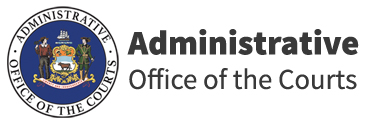Court Interpreter Program
Registration for the written exam closes soon. Learn more.
We are recruiting candidates interested in becoming court interpreters to provide services in-person and remotely for the Delaware courts. All languages will be considered. Please see the FAQs below for more information. If you have questions about the program, please email info_CIP@delaware.gov or call (302) 319-8348.
The Court Interpreter Program
The Court Interpreter Program is managed by the Administrative Office of the Courts (AOC) under the direction of the Court Interpreter Advisory Board. The Advisory Board is comprised of four Delaware judges and the State Court Administrator or designee. The Program is responsible for the development and implementation of policies and procedures on the use of interpreters in the Delaware courts; the interpreter services budget; the recruitment, testing, and certification of interpreter candidates and other general administrative duties.
The Program's goal is to provide language assistance and certified and qualified interpreters to the courts ensuring equal access to the judicial system for litigants with limited English proficiency and who are Deaf or Hard of Hearing in keeping with the Program’s guiding principle that all persons should enjoy equal access to the Delaware justice system regardless of age, color, gender, national origin, physical or mental disability, race, religion, sexual orientation, or socioeconomic status.
The existing and contemplated programs and policies of the Judicial Branch aimed at taking reasonable steps to provide meaningful access to all individuals in any encounters with the Delaware Judiciary regardless of their national origin or limited ability to read, write, speak, or understand English are contained in the Delaware Judiciary Language Access Plan, (LAP).
Becoming an Interpreter
All candidates wishing to become certified or otherwise qualified must complete a qualification and registration process consisting, in short, of four steps: orientation seminar, written exam, criminal background check and oral exam. After certification and before inclusion in the Court Interpreter Registry, the candidate will enter into a service agreement with the AOC and sign an Oath to abide by the Code of Ethics for Professional Interpreters. In order to remain in the Registry interpreter must be in good standing and comply with all steps and requirements of the Program as outlined in the Court Interpreter Program Policy Directive.
FAQs on how to become a Court InterpreterFor more information on becoming a certified interpreter in Delaware, please contact:
Court Interpreter Program Coordinator
Administrative Office of the Courts
The Renaissance Centre
405 N. King Street, Suite 507
Wilmington, DE 19801
voice: 302.255.0166
fax: 302.255.2217
info_CIP@delaware.gov
How to Request Interpreter Services
Who to contact:
If you need interpreter services (including ASL or CART) for a court hearing or trial because you are a Limited English Proficient (LEP) individual, Deaf or Hard of Hearing, or an attorney who represents either a LEP or a Deaf or Hard of Hearing individual, notify the court in which the case will be heard. Please visit the Hours & Locations section for a list of court locations.
When to contact:
To ensure that a request for interpreter services is timely provided, individuals or their attorneys if the individual is represented should make the request to the court fourteen (14) days prior to the scheduled trial or hearing. Later notice may result in the trial or hearing being rescheduled until the requested interpreter services are secured.
Exception - Individuals represented by the Public Defender:
Individuals represented by a Public Defender who need interpreter services should contact the Office of the Public Defender in the county in which the matter is being heard.
The Superior Court requires specific forms to request interpreter services:
New Castle County Superior Court RFIS
Kent County Superior Court RFIS
Sussex County Superior Court RFIS
Complaint Related to Language Services or an Interpreter
You can submit a complaint related to language services or against an interpreter or AOC Court Interpreter Program employee by filling out the Delaware Administrative Office of the Courts Court Interpreter Complaint Form. Complaints submitted will be processed according to the Court Interpreter Program Complaint Procedure Related to Language Services.



